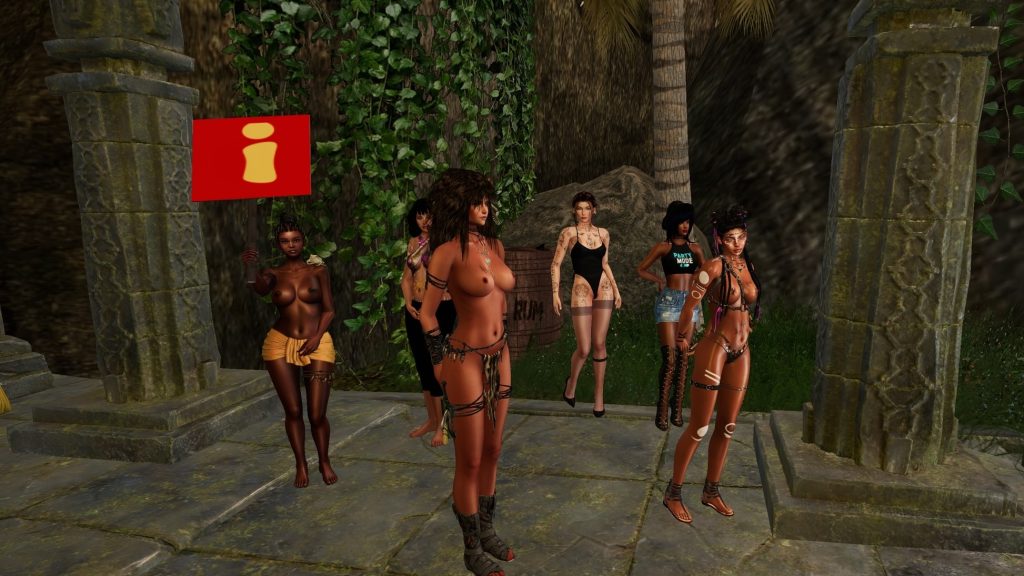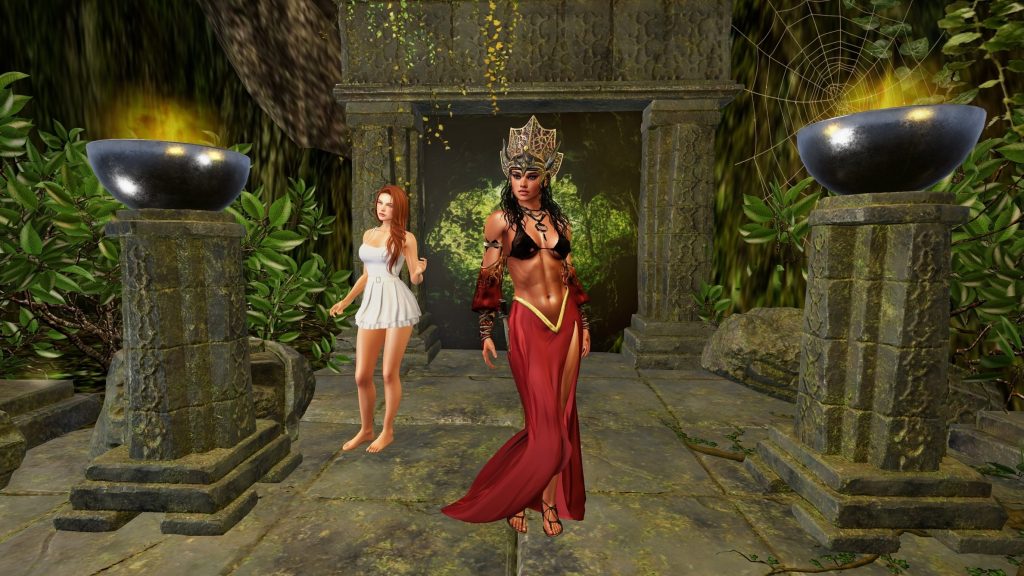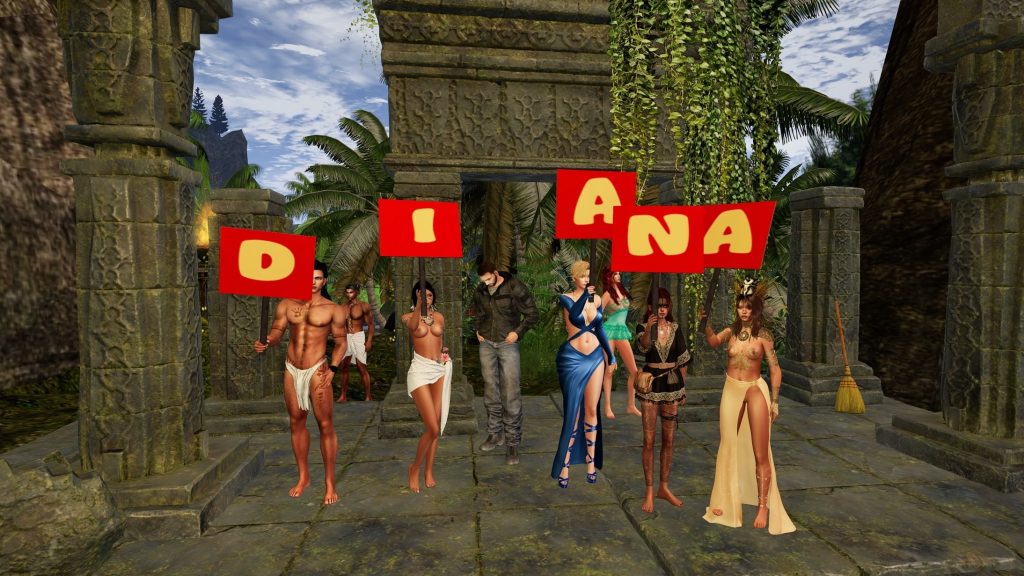
Our dear friend Diana is very ill, so on Sunday her friends and tribe gathered to send her our prayers, thoughts, and support.
On Tuesday, the Xoco gathered for a storytelling evening, where several beautiful stories celebrating Diana were shared.
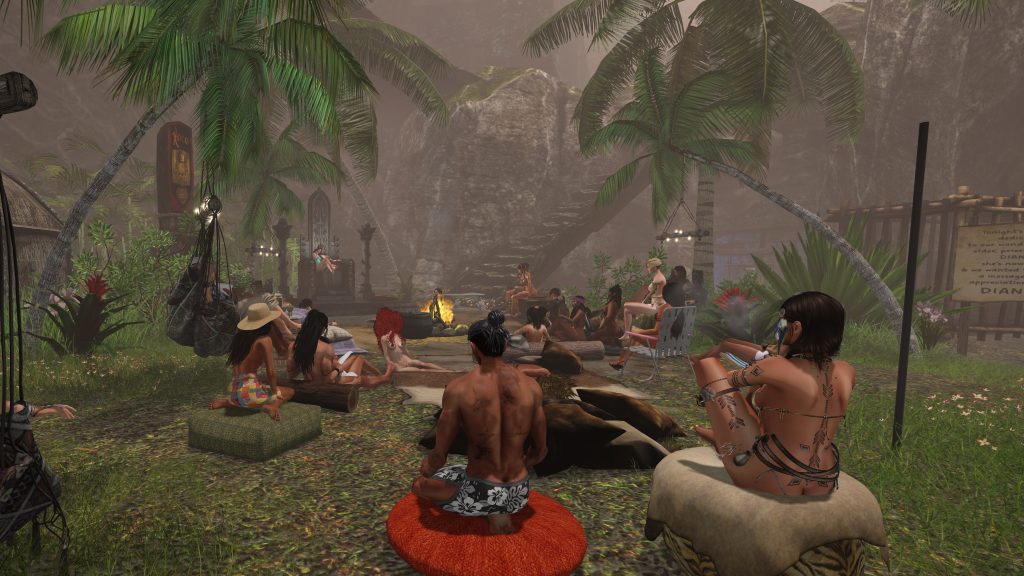
Whisper started with a beautiful tribute to Diana
smiles warmly, looking around the circle filling her pipe with weed “Today, under the warm gaze of Tupi and the rustling breath of the jungle, we gather to tell a story , not just any story, but one about someone who lives and breathes the spirit of our tribes. And to honor one of our own.”
eyes soften with reverence “This is for Diana, elder of the Xoco people.Some words for a soul who walks with both the Xoco and the Tapi, and whose footsteps leave joy wherever they fall. My friend. My sister. A steady drumbeat in the dance of our lives.”
nods slowly lighting the pipe “Diana is a very well-balanced soul—calm, grounded, and full of good sense. She has that rare gift: she solves problems before they grow, and never brings trouble with her. Wherever she is, there is clarity, kindness, and quiet strength.”breathes deeply, remembering and a spiral of smoke rises up to the sky “She is deeply devoted to her chieftess, Khaing, and to the Xoco tribe—her home, her people. And yet, the jungle winds know that part of her heart beats with the Tapi. She rarely misses a Naked Wednesday”
chuckles softly”She brings her laughter, her rhythm, and her wild joy to every gathering. When she walks into the circle, even the trees seem to sway with her energy.”
smiles fondly “Diana is a bridge between the Xoco and the Tapi—between the grounded wisdom of the village and the untamed spirit of the jungle. She moves between the tribes with grace, carrying stories, music, and love in both hands.”
sways gently , eyes half-lidded and glowing a little too red, a dreamy smile spreading on face as the jungle begins to breathe with me… or maybe that’s just the herbs. “Diana is also a storyteller of rare magic. Her favorite author is Kipling, and when she tells his tales, even the fire leans in. Her voice brings the old words to life, full of wonder and mischief and meaning. She doesn’t just tell stories—she weaves them, and we are lucky to be caught in that web.”
softens my expression “She’s a healer, too. Time and again, Diana brings her quiet strength and care to our events. I’ll never forget the first Fishing Week in 2020—I was so stoned I nearly tried to bless the fish personally. But Diana stood by me. She held me steady. Kept me standing. Kept me on the path. That’s just who she is—always there, holding space, guiding gently, never judging.”
looks upward, reverently “She was there for the first Blue Ritual in 2021, walking with us under the blue light of spirit. She was part of the great ritual of sacrifice to Yacumama, where the jungle itself held its breath. She has been present in all the great Tapi ceremonies and events, a steady force, a joyful presence, and a sacred friend.”
meets the eyes of the listeners, blinkinking slowly, red-eyed and wobbly “And through it all, Diana has always been a true and loyal friend to this shamana—to me. She has walked beside me with trust, humor, and unwavering support. I don’t yet know how I will go on without her… but I know I don’t want to try alone.”
holds up imaginary drumsticks “And of course, her drums. When Diana plays, the jungle listens. Her rhythm is deep and knowing—it carries stories, laughter, ceremony, and soul. Even Zazulu, my monkey who claims to be my spirit guide, can’t help but dance (and occasionally steal her drumsticks, which he claims are enchanted).”
folds hands gently and blows smoke “Diana is part of everything good that flows through our circles. She is laughter by the fire, wisdom in the silence, rhythm in our gatherings, and kindness in the in-between moments.”
sobs and my voice trembles, thick with tears ” Every time the Tapi gather, I feel Diana’s rhythm in my heart.Not as echo, but as living heartbeat.Not as memory, but as presence.She is here. She is joy. She is, and always will be, part of our song.”
looks out to the jungle canopy “And the jungle is better because she is part of it…. and every shamana needs a Diana…. thank you all for listening”
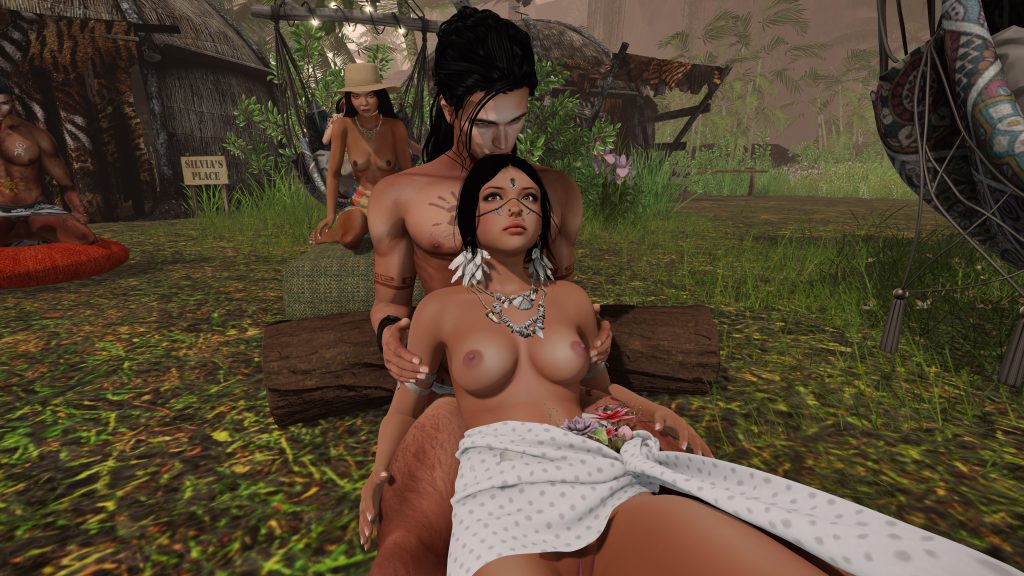
Then Catten shared the tale of Aziya, the moon priestess.
The Jungle Remembers
In the time when trees whispered and jaguars walked the earth without fear, two tribes lived near the confluence of rivers and shadow—the Arukari, who hunted, fished, and raised families beneath the canopy, and the Nahuna, a tribe who worshipped the ancient gods and guarded their sacred ways fiercely against strangers.
The Arukari knew little of the Nahuna, save that they spoke to the moon and vanished like ghosts into the jungle. Their ways were not spoken of loudly, and children were warned not to follow their drums if heard at night.One night, as the full moon crested above the palms, Tanu, a man of the Arukari, lay sleeping in his hammock. The jungle murmured softly around him, and the coals in the fire pit glowed faint and red.
His sleep was disturbed by an approaching figure.
It was Mira, a young woman of the tribe, her face lit by mischief and moonlight. She didn’t speak at first—just smiled in that playful way of hers, the kind that had gotten him into trouble many times before.
“The monkey spirit came to me,” she said at last. “In a dream.”
Tanu groaned softly. He had heard this tale before. “Your monkey spirit is a trickster. Every time he speaks his riddles to you, I end up in trouble.”
“I know,” she said, stepping closer. “But this time is different.”
Tanu shook his head. “This night is for dreaming, not for monkey foolishness.”
Mira paused, then smiled—and slowly let her robes fall. She stood nude and unafraid. The silver light kissed her curves, tracing every soft slope and secret hollow.
She took his hand and placed it on her heart. “This night is not for sleeping. It’s for witnessing. And some things shouldn’t be witnessed alone.”
Tanu watched her, and feeling her heartbeat, he rose from the hammock and followed her, as she danced naked into the beckoning jungle.
They crossed riverbank and root, through places where the forest grew so thick the moon barely pierced. Then they stopped at the sound of faint drums in the distance.
They followed the sound and reached a great hill and climbed it. At its peak stood an ancient temple. Stone lay in sacred geometry. Ceiba trees encircled the moon-temple, their trunks like pillars of a cathedral older than stars.
At the heart of the temple stood Aziya, moon priestess of the Nahuna, and surrounding her were members of her tribe.
Tanu and Mira slipped into the shadows at the back, keeping silent so as not to draw attention. They were not meant to witness this—but they watched, breath held and eyes wide with awe.
Aziya wore shimmering white drapes, her hair spilling like black water, her skin glowing with starlight. Serenity hung about her like mist.
“She is calling the moon,” Mira whispered.
Tanu said nothing. He had seen rites before. He had seen sacrifice. But this was neither.
Two young figures stepped into the light—a man and a woman, both bare, both beautiful like wild creatures. Aziya raised her arms, and they lay upon the altar.
She began to pray, and the couple embraced, becoming as one.
The drums grew louder, beating like the pulse of the jungle itself. The priestess began to chant—low at first, rising with the rhythm. The wind circled the grove. The trees swayed without touching.
Words left the priestess’s lips that no Arukari mouth could shape. The jungle listened, and Mira took Tanu’s hand.
The lovers on the altar moved in time with the drums. Their sweating bodies glowed in the moonlight, their union a ritual older than memory. Aziya’s voice rose like smoke through the branches, and the members of her tribe cried out in ecstasy.
Tanu shifted, wrapping his arms around Mira with a stirring inside him—not just lust, but reverence.
Suddenly a woman stormed from the shadows. She was tall, gaunt, and rigid, with a slash of coal painted across her face like a war-mark. Her eyes blazed with fury, and her spear was clutched in a white-knuckled grip.
She saw them—the man and woman, bare and joined beneath the gaze of the gods—and her lip curled as though she’d tasted rot.
“This is filth,” she spat. “This is not a rite—it is an abomination.”… She raised her spear, trembling with fury and loathing. “The moon is not your witness. She is your judge!”
She charged, swift and full of wrath, and thrust her spear at the lovers—but Aziya stepped between them and opened her arms, as if to embrace the blade that struck her chest.
And the moon answered.
It did not flicker or blink. It blazed.
A column of silver light struck the temple, passed through Aziya, and shattered the spear in her chest. Her body glowed—first pale, then brilliant, until none could bear to look upon her directly.
The attacker stumbled mid-stride and fell. As she hit the ground, her body disintegrated, scattering into the jungle like ash blown from a hand. She was erased from history, her name forgotten by all who knew her.
Aziya stood, radiant. Her eyes met the moon—and then she was no more.
The moon above burned twice as bright. At the base of the altar, white flowers bloomed—flowers no hand had planted, flowers no one had seen before.
The trees bowed. Even the insects held still.
Mira turned to Tanu, her face streaked with silent tears. He held her close as the Nahuna sisters left, one by one, without a word.
When they were alone, Mira stepped forward and picked a single white flower from the altar’s edge, wrapping it in cloth. No word was spoken between them—for what words could hold what they had seen?
Mira carried the flower. Tanu carried only the weight of knowing.
Since then, the moon rises differently over the hill of the Nahuna. It shines brighter—and sometimes lonelier. Aziya did not die. She was received. Some souls simply shine too brightly for the earth to hold.
There is no tomb for her, no shrine, no relic.
Just a story that a monkey spirit wanted the jungle to remember.
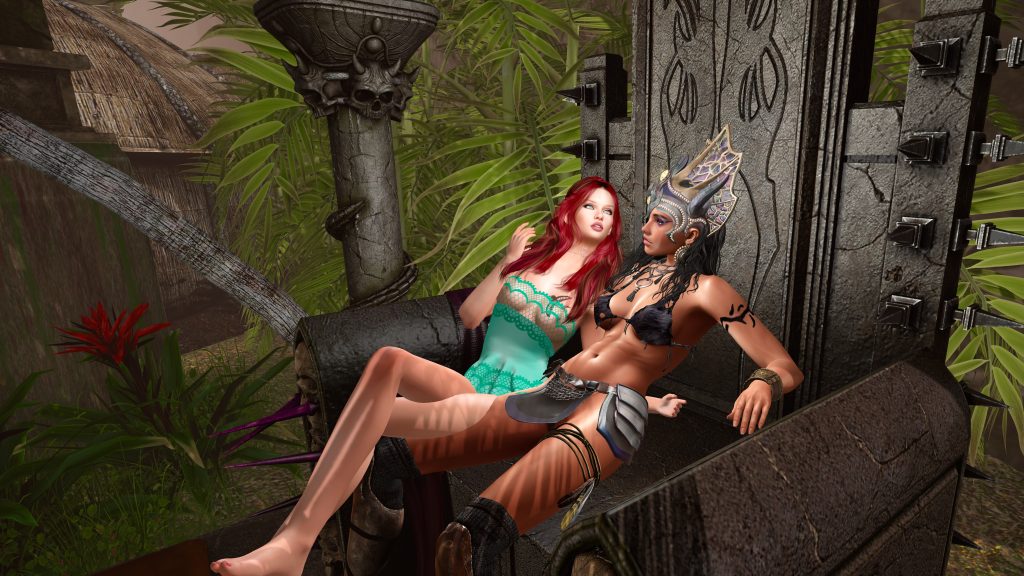
Khaing shared a heartfelt story and a beautiful poem in honor of Diana
Our beloved Diana tells me she’s often moved to tears at our initiations of new sisters. At a Xocó initiation, we pray a new sister, will live proudly amongst us and we ask the Gods to ennoble her with Amazon glory, make her valiant and one with Water, Fire, Eagle and Jaguar – in other words completely at one with her environment and everyone in it.
Our beloved Diana tells me she’s often moved to tears at our initiations of new sisters. At a Xocó initiation, we pray a new sister, will live proudly amongst us and we ask the Gods to ennoble her with Amazon glory, make her valiant and one with Water, Fire, Eagle and Jaguar – in other words completely at one with her environment and everyone in it.These are lofty aspirations, but Diana totally lives up to them. She’s one of the core pillars of Xocó, an utterly reliable, practical & wise elder, available virtually every day, supporting others, cooking, managing our music, DJing and supporting the tribe financially. The danger of having someone like Diana, is that, sadly, she can be taken for granted – so easy to do. So now she’s incapacitated, we need to tell her how much she is appreciated! Her favourite saying to me is: ‘Chieftess, I am here to offer you solutions not problems’. And she’s always done just that.
Diana loves her tribe and the Amazon so much, that I want to quote something written about love. It’s from my own Hindu culture, a poem by Rabindranath Tagore. ((It was read at the recent wedding of my real life friends at the ancient Bath Abbey)). This fits well with some of tonight’s stories, as they are about love:
‘Unendng Love’
I seem to have loved you in numberless forms, numberless times…
In life after life, in age after age, forever.
My spellbound heart has made and remade the necklace of songs,
That you take as a gift, wear round your neck in your many forms,
In life after life, in age after age, forever.Whenever I hear old chronicles of love, its age-old pain,
Its ancient tale of being apart or together.
As I stare on and on into the past, in the end you emerge,
Clad in the light of a pole-star piercing the darkness of time:
You become an image of what is remembered forever.You and I have floated here on the stream that brings from the fount.
At the heart of time, love of one for another.
We have played alongside millions of lovers, shared in the same
Shy sweetness of meeting, the same distressful tears of farewell-
Old love but in shapes that renew and renew foreverToday it is heaped at your feet, it has found its end in you
The love of all our days both past and forever:
Universal joy, universal sorrow, universal life.
The memories of all loves merging with this one love of ours –
And the songs of every poet past and forever.We love you Diana!
AYAHUE!!
Finally, Cento shared a humorous and unforgettable memory of a roleplay event that still brings us laughter today.
Diana used to re-enact this myth about Mama Quilla. It was a serious religious ceremony. She said she couldn’t get any guys to do it, could I please please… please do her this favour. So I said OK what do I have to do?
Diana said “You’ll have lines and things and eventually you’ll have sex on an altar but I’ll coach you in IM”
I said “erm ok”
There was only time for a few rehearsals. But Diana was very, very strict at rehearsals.
“ME can we rehearse the sex scene again”
Diana “NO Cento”So it’s the day of the actual play. There was one scene where I had to do many things at once. Move, do gestures say lines, take off clothes, move again – say more lines, get on altar, (play animation, hit hud) and then have sex. I never seemed to get it right. And Diana was very exact and demanding about detailsSo the scene starts and as promised Diana was coaching me (in IM.) She was frantic at times
“No CENTO take off your clothes. get naked. then speak.”
“CENTO say your lines THEN move to altar. CENTO! CENTO! Your cock’s not hard it needs to be hard during sex”
“CENTO you were supposed to cum. Cum now Cento. Now!”Needless to say Diana and I got through the performance and went on to do several more of these plays. And this was years ago but Diana and I laughed about it many times ever since.
Whispering: I remember well a sentence from cento in that act “and I impale her with all my strength”. I never forgot the impale word again. From that day on, I referred to Cento as the Impaler.
THE INCA ORIGIN MYTH – Khaing
The Incas built one of the largest & wealthiest empires in South America in the 1400s. They called their empire Tahuantinsuyu, the four united quarters. The Incas had a complicated political and religious system. They worshipped many gods and their religious ceremonies centred on the rain and the sun. They believed that Viracocha, their most important God, created all of nature. Special teachers called amautas, or storytellers taught Inca history in the form of legends & myths. Some of us here now are the descendants of amautas and so we continue to tell stories.THIS INCA STORY OF CREATION
The Sun rises & sets, the world spins, people live and die. Such are the cycles of time which have endured through all the ages. Those who speak the Quechua language call this Pachacuti.The age of the first Sun was born in the darkness of the beginning. The people made then were primitive creatures, cousins of the wari, a beast which is part-llama, part-alpaca. Some of these people worshipped Virococha, saying he had made them; others said Pachacamac. Unable to make clothes they covered themselves in leaves and lived very simple lives.
The age of the Second Sun belonged to the Wari Runa, the wari people, a race with a little more understanding. Dressed in animal skins, they tended the soil and grew a few simple crops. Their god was Virococha. A great flood ended their peaceful lives.
The age of the third Sun was a good time and a bad time. It belonged to the Purun Runa, the wild people. Their god was Pachacamac and they enjoyed the plenty of things he provided.
They spun wool into yarn and wove and coloured the yarn to make cloth for clothing. They planted and harvested their own crops. They mined the Earth for her hoard of gold, silver and precious stones which they turned into jewellery and other beautiful ornaments. With good food in their bellies and warm clothes on their backs, they were healthy and strong and increased in number. Soon there was not enough space for them in their highland homes and they spread out into the lowlands and the forests. But now, instead of sharing what they had, the people became afraid of losing it. Possessive, acquisitive and defensive of territory and of possessions. So they banded together in towns, each under the rule of a different king. For the first time since the Creation, the people went to war with each other.
The age of the fourth Sun continued the mood of the third. This was the time of the Auca Runa, the warlike people. From their stone houses and forts on the tops of mountains, they kept lookouts and guarded themselves from attack. This was an age of battles and wars. The people were divided into ayllus, or groups of relatives, according to their blood. The land too was divided into four united quarters called Tahuantinsuyu.
The age of the fifth Sun flowered into the age of the glorious Inca Empire, which stretched north, south, east and west across Tahuantinsuyu, over coastal desert, frozen mountain and fertile valley and dazzled with its imperial wonders: it’s network of roads, which allowed for good communications and the rapid movement of soldiers; its irrigation systems, which brought water to parched earth; its agricultural terraces, climbing up the hillsides like stairways for giants, which produced not only enough food for the multitude, but loads extra; its monumental buildings, erected without the benefit of iron tools or the wheel and constructed of stones which interlock which such total precision that barely a whisper can pass between them; its handicrafts in weaving and pottery and jewellery and gold; and presiding about it all, the High King himself, the Inca.
Sadly, with time all that wonder and glory has passed. We are their distant descendants and we have the benefit of the crops and vegetables they developed over thousands of years, their knowledge and of course their gods are still with us and are now our gods, especially Lord Inti, the God of the Sun and his wife, Mama Quilla, Goddess of the Moon.
AYAHUE!
Wherever your path takes you, Diana—know you are loved, remembered, and part of us always.
